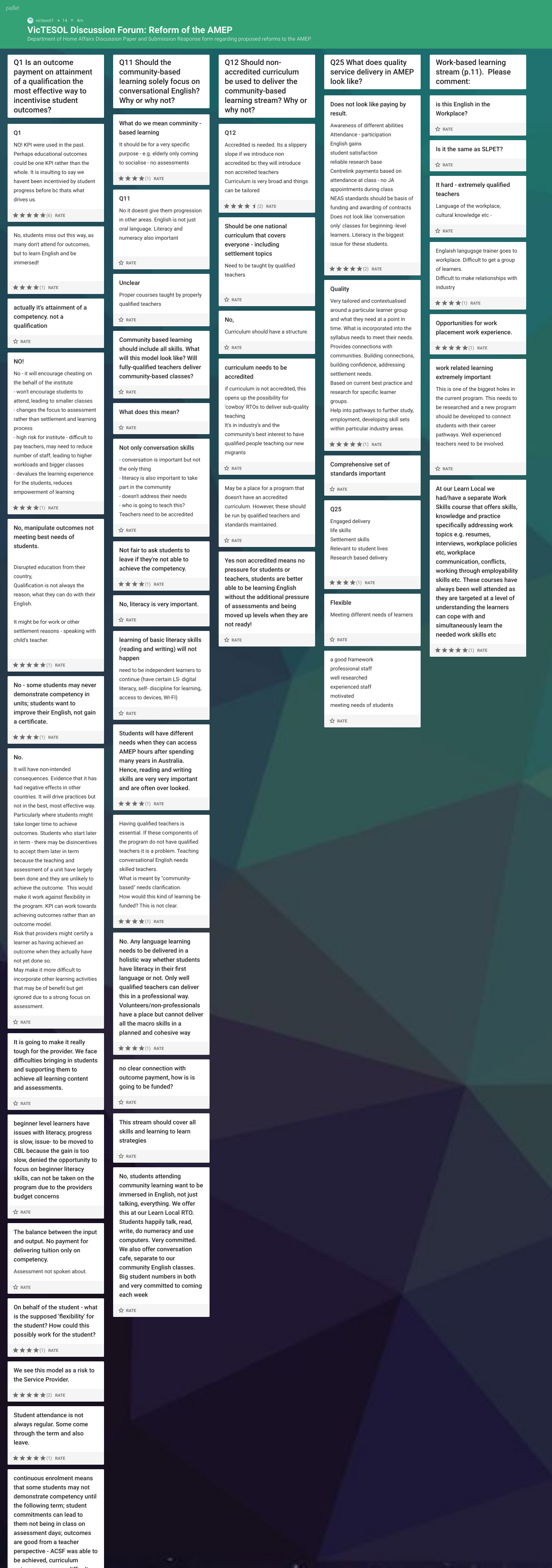Please visit the Department of Home Affairs website to make a submission:
https://www.homeaffairs.gov.au/reports-and-publications/submissions-and-discussion-papers/amep-reform-submission-form


Discussion Questions
What questions emerged from the presentation for you?
What might it look like to promote learner agency in the TESOL classroom?
To what extent do you think it matters what kind of motivational orientation learners have?
Tuesday March 30, 4:30-6:00 pm
Online Event
VicTESOL held an afternoon of sharing on the topic of multimedia use in the adult TESOL classroom. The session began with three teachers sharing how they use multimedia in their practice.
Fiona Norquay from Carlton Neighbourhood Learning Centre demonstrated how she uses ABC’s ‘90 second news’ program with intermediate level students. Angela Fourtounis from RMIT shared her knowledge of useful apps for learning – Padlet and Mentimeter. And Fran Conron from The Gordon showed how she uses Tropfest videos in the classroom.
We then broke into small groups to discuss and share ideas for how multimedia can support and enhance the learning of Adult EAL learners.
Resources from the session
Fran Conran – Using TropFest Films in the classroom
Fiona Norquay – 90 Second ABC News
Angela Fourtounis
Angela spoke about two apps she uses in the classroom. Here are the links.
Padlet – https://padlet.com/ and https://www.bookwidgets.com/blog/2017/08/30-creative-ways-to-use-padlet-for-teachers-and-students
Mentimeter – https://www.mentimeter.com/
Jenny Robins
Thursday 4 March 2021, 4-5:30 pm (AEDT)
Online Event
Jenny Robins began as a volunteer in 2011, then became a qualified teacher, working with adult migrants, people from refugee backgrounds and people seeking asylum to help them improve their English.
In 2017 Jenny decided to improve her skills and enrolled in a Masters of Learning Intervention in the Graduate School of Education at the University of Melbourne. She has found this invaluable as the course’s students are encouraged to tailor the subjects’ assignments to their context and needs and those of their students. Jenny currently works at Yarraville Community Centre.
In her Masters’ literacy subject students had to design, implement and report on an intervention with their students. Jenny chose to help her students with their spelling, and this presentation describes the intervention she designed and delivered. The intervention’s activities revolved around the multiple ways long vowels can be spelt, but its main focus was on teaching the students spelling strategies which they could apply later.
Jenny presented on her experience with teaching adults, however the session was open to teachers from all sectors and the ideas in the session are transferable and applicable to all age groups.
Recording of the presentation
Presentation Documents
Useful Resources
These are some resources recommended by the presenter and some participants during the session. Some of these resources are freely available, and some can be accessed through university libraries. Often Alumni can access their university’s library for a small fee each year.
Annesley, M. (2009). Sounds Right Looks Right. South Australia: TAFE SA.
Bear, D., Invernizzi, M., Templeton, S., & Johnston, F. (2016). Words their way. Word study for phonics, vocabulary, and spelling instruction. (6th ed.). Boston: Pearson.
Wardle, J. (2017). Sound spelling workbook: a teacher resource to support the writing skills of adult LLN learners. Melbourne: AMES.
Reading Rockets, (n.d). How spelling supports reading. Retrieved from
http://www.readingrockets.org/reading-topics/spelling-and-word-study
Australian spelling
Henderson, C. (1994). The Sound Way to Spelling, Writing and Reading.
American Spelling
Spalding, Romelda. (2003). The writing road to reading : the Spalding method for teaching speech, spelling, writing, and reading. New York: Harper Resource
Pronunciation
Jane Passey’s Cued articulation. I use this video for her gestures: https://www.youtube.com/watch?v=BPLnfNciLbA
Achren, L. & William, A. (2006). Teaching Issues 8: Fact sheet – learners with low literacy in the AMEP. Sydney: Adult Migrant English Program Research Centre, Macquarie University. Retrieved from: http://www.ameprc.mq.edu.au/__data/assets/pdf_file/0010/229375/08Teachingissues.pdf
General
Power, M. (2008). Passages to English 1. Fitzroy: The Bookery.
Power, M. (2008). Passages to English 2. Fitzroy: The Bookery.
Power, M. (2013). Passages to English 3. Fitzroy: The Bookery.
Reading Rockets, n.d. How spelling supports reading. Retrieved from: http://www.readingrockets.org/reading-topics/spelling-and-word-study
Adult Migrant English Program Research Centre (adult learners)
http://www.ameprc.mq.edu.au/resources
Small group discussion questions:
Jacky Springall
Tuesday 10 November 2020, 4:00-5:30pm AEDT
Online Workshop
This practical workshop was based on the premise that EAL teachers need to be pro-active in integrating a focus on pronunciation at all levels of teaching with the main goal of instruction being achieving intelligibility. The session gave a brief overview of the different components of pronunciation that students need to master to both make sense of what they hear and to be understood when they speak, and then provided some ideas for the adult EAL classroom which relate to larger units of speech (suprasegmental elements) primarily stress, rhythm and intonation. Most of these activities can be adapted to any level or context. Jacky’s presentation was followed by Q&A and small group discussions.
Jacky Springall has spent most of her EAL career working with new adult migrants and refugees in the Adult Migrant English Program. This has included classroom teaching, curriculum and professional development roles and coordination of delivery programs. One of her enduring interests has been the integration of pronunciation teaching in everyday EAL programs and its significance for the acquisition of oral language skills. Jacky was involved in several collaborations on teaching pronunciation with Dr. Lynda Yates in the golden days of the AMEP Research Centre resulting in Teaching Pronunciation fact sheets and a professional development kit for assessing intelligibility. Jacky is currently working for Box Hill Institute coordinating the AMEP and SEE programs at Lilydale and Ringwood.
In the breakout groups, the participants discussed:
LMERC information can be accessed by clicking here. Find out about the collection, services, loan periods and instructions for joining.
During your discussion, the time is yours as a group to use it in any way you see fit. The following questions are there to provide stimulus.
Discussion Questions:
Remember to share your resource suggestions and documents on the Padlet page. A link to this page will be provided in the email we send you the day after the event. Here is a link to the Padlet:
https://padlet.com/plcoordinator/3iljyoo41ykyuiq8